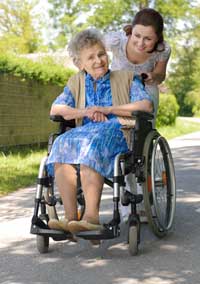While the impact of brain damage depends on the part of the brain that is injured, certain cognitive functions can also be affected in some chronic disabilities.
 In MS, cognitive problems may be described as a reduction
of mental sharpness. The main areas affected are complex attention (e.g., multi-tasking), information processing speed, learning, memory and executive functioning. Executive functions include problem solving, the ability to plan and organize,
and word finding. Problems with memory are the most frequent complaint among people with MS. There may also be challenges related to learning new things; these are more likely attributed to concentration difficulties than to problems recalling information.
In MS, cognitive problems may be described as a reduction
of mental sharpness. The main areas affected are complex attention (e.g., multi-tasking), information processing speed, learning, memory and executive functioning. Executive functions include problem solving, the ability to plan and organize,
and word finding. Problems with memory are the most frequent complaint among people with MS. There may also be challenges related to learning new things; these are more likely attributed to concentration difficulties than to problems recalling information.
Just as the nature and severity of MS-related physical problems can vary depending on whether the disease has a relapsing-remitting, secondary or primary progressive course, the timing and impact of MS on cognitive abilities also varies - no two persons are affected the same way. Individuals with relapsing-remitting MS show a lower degree of cognitive impairment compared to those with chronic progressive MS. Cognitive dysfunction may occur in up to 53% of those with secondary progressive MS, but in only 7% of those with primary MS. Disease-modifying medications for MS may also impair cognitive performance.
The impact of cognitive difficulties on daily life can be devastating. Within 10 years of diagnosis, more than 80% of persons with MS are unemployed. Restriction of occupational and social activities is associated with cognitive impairment among individuals with early onset MS, independent of physical disability.
 Although Parkinson’s disease is predominantly a
movement disorder, there is evidence that dementia-related cognitive skill deterioration also takes place. Cognitive difficulties include slower processing speed and impaired executive function and memory retrieval. Age-related depression may also
have some impact on cognitive function in this group. The medications that alleviate Parkinsonian symptoms provide little cognitive benefit and may actually cause confusion and hallucinations. In addition, individuals with Parkinson’s disease are
two to six times more likely to develop dementia than the population as a whole.
Although Parkinson’s disease is predominantly a
movement disorder, there is evidence that dementia-related cognitive skill deterioration also takes place. Cognitive difficulties include slower processing speed and impaired executive function and memory retrieval. Age-related depression may also
have some impact on cognitive function in this group. The medications that alleviate Parkinsonian symptoms provide little cognitive benefit and may actually cause confusion and hallucinations. In addition, individuals with Parkinson’s disease are
two to six times more likely to develop dementia than the population as a whole.
 Memory impairment, the first sign of cognitive decline
in those with Alzheimer’s disease, often appears several years before the actual clinical diagnosis of the disease. In fact, impairments in multiple cognitive domains are typically observed several years before clinical diagnosis. Pre-diagnosis deficits
include:
Memory impairment, the first sign of cognitive decline
in those with Alzheimer’s disease, often appears several years before the actual clinical diagnosis of the disease. In fact, impairments in multiple cognitive domains are typically observed several years before clinical diagnosis. Pre-diagnosis deficits
include:
- memory for life events
- executive functioning
- verbal ability
- visual spatial skill
- attention
- perceptual speed
Decline in these functions is not qualitatively different from those seen with normal aging, but the degree of impairment is greater at an earlier age. Over time, individuals may develop increasing difficulties with learning, memory, language and visual spatial skills, depending on the degree of damage to the brain.
Evidence suggests that individuals with higher IQ, education, occupational attainment or participation in leisure activities may have a reduced risk of Alzheimer’s disease.
 Spina bifida meningomyelocele (SBM), a neural tube
defect, is associated with distinctive physical, neural and cognitive deficits (Dennis et al., 2006a). The higher the level of the spinal lesion, the more the brain and cognition are affected in childhood. In adults, spinal lesion levels affect motor
skills (including speech production), but not cognitive and academic function. Children and adults with SBM have better reading than math skills and unbalanced IQ test scores favoring verbal skills over other skill areas. The greater the number of
shunts a person has, the poorer their functional numeracy skills and memory skills.
Spina bifida meningomyelocele (SBM), a neural tube
defect, is associated with distinctive physical, neural and cognitive deficits (Dennis et al., 2006a). The higher the level of the spinal lesion, the more the brain and cognition are affected in childhood. In adults, spinal lesion levels affect motor
skills (including speech production), but not cognitive and academic function. Children and adults with SBM have better reading than math skills and unbalanced IQ test scores favoring verbal skills over other skill areas. The greater the number of
shunts a person has, the poorer their functional numeracy skills and memory skills.
The ability to process simple information is unaffected in SBM, but complex thinking and manipulation of information, memory for people and past events, and memory of tasks to be done in the future are more of a challenge. The more functionally independent people with SBM are, the better their memory skills.
 Individuals with fibromyalgia often report
feeling as if they were in a mental fog. Although some cognitive functions - such as information processing speed - are typical for people their age, the ability to multi-task (i.e., divide attention) and manipulate numbers or other information in
their head is similar to that of a person 20 years older. The ability to recall a specific word from memory is also challenging for people with fibromyalgia.
Individuals with fibromyalgia often report
feeling as if they were in a mental fog. Although some cognitive functions - such as information processing speed - are typical for people their age, the ability to multi-task (i.e., divide attention) and manipulate numbers or other information in
their head is similar to that of a person 20 years older. The ability to recall a specific word from memory is also challenging for people with fibromyalgia.
Although individuals with fibromyalgia typically experience chronic pain, poor sleep patterns, fatigue, and some level of depression and anxiety - all of which are commonly related to cognitive difficulties - research indicates that only the level of reported pain was related to cognitive limitations.
 Although aging is not a chronic disability, it does have
an impact on certain cognitive functions. Skills related to fluid intelligence (i.e., abstract thinking, problem solving) decline after 25 to 30 years of age, while skills related to crystallized intelligence (i.e., memory of facts, acquired knowledge)
increase to 60 years or more without any evidence of decline. Physiological changes in aging are associated with slower reaction time, poorer memory and declining executive processes.
Although aging is not a chronic disability, it does have
an impact on certain cognitive functions. Skills related to fluid intelligence (i.e., abstract thinking, problem solving) decline after 25 to 30 years of age, while skills related to crystallized intelligence (i.e., memory of facts, acquired knowledge)
increase to 60 years or more without any evidence of decline. Physiological changes in aging are associated with slower reaction time, poorer memory and declining executive processes.
However, memory can be improved significantly later in life with a variety of techniques, including engagement in intellectual activities and strenuous physical activity. Programs for developing cognitive skills and/or preventing their decline are effective, but are skill specific and not generalizable to other skills. Cognitive training programs should be built around the interests and cognitive skills of the participants. Here are some examples of the skills practised during particular activities:
- Playing cards – memory, problem solving, strategizing
- Math puzzles – numerical ability
- Reading mystery novels – inductive and deductive reasoning
- Travelling – problem solving, spatial orientation
- Reading racing forms – visual-spatial ability, analytical skills